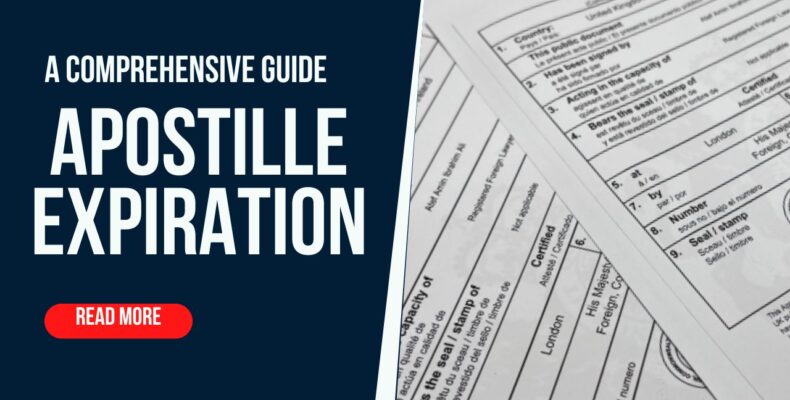In today’s globalized world, the apostille has become an essential tool for authenticating public documents for international use. Whether you’re planning to study, work, or conduct business abroad, an apostille can streamline the process of verifying the legitimacy of your documents. However, one common question that often arises is: Does the apostille expire? This comprehensive guide aims to provide clarity on this matter, addressing various scenarios and considerations to ensure your apostilled documents remain legally binding for their intended purpose.
What is an Apostille?
An apostille is an internationally recognized certification that verifies the authenticity of a public document, such as a birth certificate, death certificate, or academic transcript. This certification is governed by the Hague Convention of 1961, which has been adopted by over 100 countries, including the United States.
To fully understand the intricacies of apostilling vital records, check out our comprehensive guide on apostille for birth and death certificates.
Does an Apostille Expire?
The short answer is: No, an apostille itself does not have an expiration date. However, the validity of an apostilled document may be subject to certain factors and considerations:
- Document Expiration: While the apostille itself does not expire, the document being apostilled may have its own expiration date or validity period. For example, a passport or a background check may have a specified expiration date, which would render the apostille invalid once the document expires.
- Purpose of Use: The validity of an apostilled document also depends on the purpose for which it is being used. Some apostilled documents may have a limited validity period for specific purposes, such as employment or immigration applications.
- Issuing Authority: In some cases, the issuing authority may impose validity restrictions on the apostilled document. For instance, certain educational institutions or government agencies may require apostilled documents to be resubmitted periodically or within a specific timeframe.
For clarity on who can perform apostille services, read our informative article on whether a notary can apostille a document.
Factors Affecting Apostille Validity
To better understand the validity of an apostilled document, it’s essential to consider the following factors:
- Document Type: The type of document being apostilled can influence its validity period. For example, apostille birth certificates and marriage certificates are generally considered valid indefinitely, while apostille diplomas or transcripts may have a shorter validity period.
- Country of Use: Different countries may have varying requirements and regulations regarding the validity of apostille documents. It’s crucial to research the specific guidelines of the country where the apostilled document will be used.
- Issuing Authority Requirements: As mentioned earlier, some issuing authorities may impose their own validity periods or requirements for apostille documents, which must be adhered to.
Learn about the proper steps to take when dealing with translations and apostilles in our detailed post on whether to translate before or after apostille.
Frequently Asked Questions (FAQs)
Can I use an apostille document after a certain number of years?
The validity of an apostilled document largely depends on the type of document, the purpose of use, and the requirements of the issuing authority or the country where it will be used. While some documents may be valid indefinitely, others may have specific validity periods.
Do I need to re-apostille my document if it’s still valid?
In most cases, if the apostilled document is still valid and meets the requirements of the country or institution where it will be used, there is no need to re-apostille it. However, it’s always advisable to check with the relevant authorities to ensure compliance.
How can I ensure my apostilled document remains valid?
To ensure the validity of your apostilled document, it’s essential to carefully review the requirements of the issuing authority, the country of use, and the purpose for which the document will be used. Additionally, keep track of any expiration dates or validity periods associated with the document itself.
What should I do if my apostilled document expires or becomes invalid?
If your apostilled document expires or becomes invalid, you may need to obtain a new certified copy of the document and have it re-apostilled. It’s recommended to plan ahead and initiate the process well in advance to avoid any delays or complications.
Can an apostille be revoked or invalidated?
In rare cases, an apostille may be revoked or invalidated by the issuing authority if it is discovered that the document was obtained through fraudulent means or contains inaccurate information. It’s essential to ensure the authenticity and accuracy of the documents being apostilled.
Key Takeaways
- An apostille itself does not have an expiration date, but the validity of an apostilled document may be subject to various factors.
- Document type, purpose of use, issuing authority requirements, and country of use can all influence the validity period of an apostilled document.
- It’s crucial to research and understand the specific guidelines and requirements related to apostille validity for your particular situation.
- Regularly checking expiration dates, validity periods, and any changes in regulations can help ensure your apostilled documents remain legally binding.
Conclusion
The apostille is a valuable tool for streamlining the authentication process of public documents for international use. While the apostille itself does not expire, the validity of an apostilled document can be influenced by various factors, including document type, purpose of use, issuing authority requirements, and country-specific regulations. By understanding these nuances and staying informed, you can ensure that your apostilled documents remain legally binding and accepted for their intended purpose. If you have any specific concerns or questions, it’s always advisable to consult with the relevant authorities or seek professional assistance to ensure compliance and avoid any potential complications.

